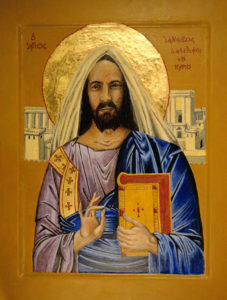Festival of St. James of Jerusalem, Brother of Jesus and Martyr
October 23
The Lord be with you
St. James of Jerusalem (or “James the Just”) is referred to by St. Paul as “the Lord’s brother” (Galatians 1:19). The New Testament refers to “brothers and sisters” of Jesus (Matthew 13:53; Mark 6:3; John 7:3; Acts 1:14; 1 Corinthians 9:5). Many modern theologians believe that James was a son of Joseph and Mary and, therefore, a biological brother of Jesus. But throughout most of the Church (historically, and even today), Paul’s term “brother” is understood as “cousin” or “kinsman,” and James is thought to be the son of a sister of Joseph or Mary who was widowed and had come to live with them. Others have thought that when Joseph married Mary he was a widower, and James was a son from his first marriage. Such understandings of the relationship of James to the Holy Family start as early as the Second Century, as well as the concept of the perpetual virginity of Mary. In these early writings, these arguments were always centered on defending the virgin birth of our Lord. How could Joseph, or any other man for that matter, be the human father of Jesus if Mary had remained a virgin her entire life?
always centered on defending the virgin birth of our Lord. How could Joseph, or any other man for that matter, be the human father of Jesus if Mary had remained a virgin her entire life?
Along with other relatives of our Lord (except Joseph, who died before Jesus entered his public ministry, and his mother Mary), James did not believe in Jesus until after His resurrection (John 7:3-5; 1 Corinthians 15:7). After becoming a Christian, James was elevated to a position of leadership within the earliest Christian community. Especially following St. Peter’s departure from Jerusalem, James was recognized as the bishop of the Church in that city (Acts 12:17; 15:12ff.), with a special calling to the Jews (Galatians 2:9). According to the historian Josephus, James was martyred in 62 AD by being stoned to death by the Sadducees. Hegesippus adds that this happened at the Temple after James claimed that Jesus was the “Son of Man.” James was then thrown from the Temple and stoned to death. James authored the Epistle in the New Testament that bears his name. In it, he exhorts his readers to remain steadfast in the one true faith, even in the face of suffering and temptation, and to live by faith the life that is in Christ Jesus. Such a faith, he makes clear, is a busy and active thing, which never ceases to do good, to confess the Gospel by words and actions, and to stake its life, both now and forever, in the cross.
In recent years James has been in the headlines around the world because of a first century ossuary that has been found inscribed “James, the Brother of Jesus.” An ossuary is a box that the bones of a deceased person were put in. In the burial practices of first century Jews, the departed were placed on a ledge in a cave. After a year or so, when the body had decomposed, the bones were placed in the ossuary. The James ossuary is authentic, meaning it really is a first century artifact and the inscription was really made in the first century. It also seems most likely that the James referred to is the one we remember today. This underscores the reliability of the biblical record.
Collect for the Festival of St. James of Jerusalem, Brother of Jesus and Martyr: Heavenly Father, shepherd of Your people, You raised up James the Just, brother of our Lord, to lead and guide Your Church. Grant that we may follow his example of prayer and reconciliation and be strengthened by the witness of his death; through Jesus Christ, Your Son, our Lord, who lives and reigns with You and the Holy Spirit, one God, now and forever. Amen.
Alternate Collect: Grant, O God, that following the example of Your servant James the Just, brother of our Lord, Your Church may give itself continually to prayer and to the reconciliation of all who are at variance and enmity; through Jesus Christ our Lord, who lives and reigns with you and the Holy Spirit, one God, now and forever. Amen.
Others prayer suggestions:
• For the church in Jerusalem
• For peace in the Holy Land
• For Church leaders
• For God’s grace to live a just and righteous life
• For the work of archeology
Blessings in Christ,
Pastor John Rickert
